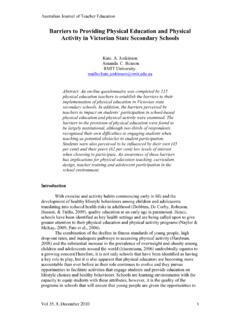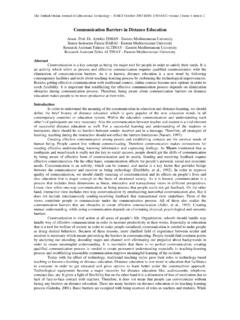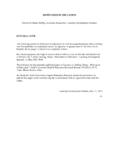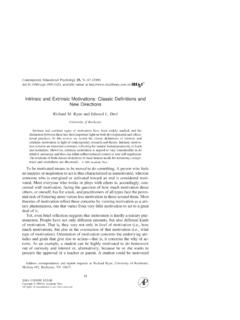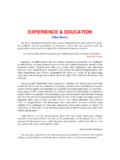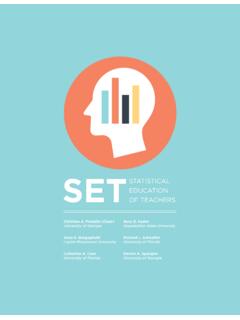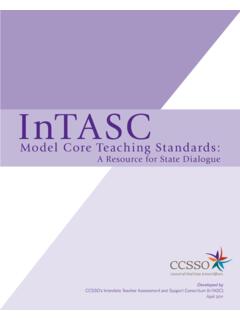Transcription of STUDENT AGENCY FOR 2030 - OECD
1 STUDENT AGENCY STUDENT AGENCY FOR 2030 FOR 2030 OECD Future of education and Skills 2030 Conceptual learning frameworkWell-being2030 ActionAnticipationRe ectionValuesAttitudesKnowledgeSkillsCore foundationsTransformativecompetenciesCre atingnewvalueTakingresponsibilityReconci lingtensions&dilemmasCo- AGENCY with peers, teachers, parents, communitiesCompetenciesWell-being2030 STUDENT agencyMore content at: this page foran interactive experienceSTUDENT AGENCY FOR 2030 The concept of STUDENT AGENCY , as understood in the context of the OECD Learning Compass 2030, is rooted in the principle that students have the ability and the will to positively influence their own lives and the world around them. STUDENT AGENCY is thus defined as the capacity to set a goal, reflect and act responsibly to effect change.
2 It is about acting rather than being acted upon; shaping rather than being shaped; and making responsible decisions and choices rather than accepting those determined by others. When students are agents in their learning, that is, when they play an active role in deciding what and how they will learn, they tend to show greater motivation to learn and are more likely to define objectives for their learning. These students are also more likely to have learned how to learn an invaluable skill that they can and will use throughout their can be exercised in nearly every context: moral, social, economic, creative. For example, students need to use moral AGENCY to help them make decisions that recognise the rights and needs of others. While a well-developed sense of AGENCY can help individuals achieve long-term goals and overcome adversity, students need foundational cognitive, social and emotional skills so that they can apply AGENCY to their own and society s is perceived and interpreted differently around the world.
3 Some languages have no direct translation for the term STUDENT AGENCY as it is used in the OECD Learning Compass 2030; interpretations will vary across different societies and contexts. Nonetheless, the notion of students playing an active role in their education is central to the Learning Compass and is being emphasised in a growing number of education systems that encourage STUDENT AGENCY , learning involves not only instruction and evaluation but also co-construction. Co- AGENCY is when teachers and students become co-creators in the teaching-and-learning process. The concept of co- AGENCY recognises that students , teachers, parents and communities work together to help students progress towards their shared POINTS AGENCY implies having the ability and the will to positively influence one s own life and the world around them.
4 In order to exercise AGENCY to the full potential, students need to build foundation skills. The concept of STUDENT AGENCY varies across cultures and develops over a lifetime. Co- AGENCY is defined as interactive, mutually supportive relationships with parents, teachers, the community, and with each other that help students progress towards their shared BRIEFWhen students are agents in their learning, they are more likely to have learned how to learn an invaluable skill that they can use throughout their the full concept note, click ectionValuesAttitudesKnowledgeSkillsCore foundationsTransformativecompetenciesCre atingnewvalueTakingresponsibilityReconci lingtensions&dilemmasCo- AGENCY with peers, teachers, parents, communitiesCompetenciesWell-being2030 STUDENT agencyOECD LEARNING COMPASS 2030 STUDENT AGENCY , India, The Duke of Edinburgh s International Award Foundation Source.
5 IN ACTIONMs Kiran BIR SETHI, Founder, Riverside School and Design For Change, India Source: AGENCYV isit: DOWNLOAD the free SnapPress mobile app2. SCAN this page with 3. DISCOVER interactive contentmobile app2 SCAN. DISCOVER 4 OECD Future of education and Skills 2030 Concept Note OECD 2019 STUDENT AGENCY for 2030 There is no global consensus on the definition of STUDENT AGENCY . In the context of the OECD Learning Compass 2030, STUDENT AGENCY implies a sense of responsibility as students participate in society and aim to influence people, events and circumstances for the better. AGENCY requires the ability to frame a guiding purpose and identify actions to achieve a goal (OECD, 2018[1]). It is about acting rather than being acted upon; shaping rather than being shaped; and making responsible decisions and choices rather than accepting those determined by others.
6 STUDENT AGENCY is not a personality trait; it is something malleable and learnable. The term STUDENT AGENCY is often mistakenly used as a synonym for STUDENT autonomy , STUDENT voice and STUDENT choice ; but it is much more than these concepts. Acting autonomously does not mean functioning in social isolation, nor does it mean acting solely in self-interest. Similarly, STUDENT AGENCY does not mean that students can voice whatever they want or can choose whatever subjects they wish to learn. Indeed, students need support from adults in order to exercise their AGENCY and realise their potential. For example, the OECD Programme for International STUDENT Assessment found that certain methods teachers use in class may be more effective for some students than for others.
7 When mathematics teachers let 15-year-old students decide on their own procedures to solve a problem in class, or when they present problems in different contexts, not only do socio-economically advantaged students benefit more from these approaches than disadvantaged students do, but the approaches can have an adverse impact on disadvantaged students performance (Figure 1) (OECD, 2012[2]). It is thus particularly important to ensure that disadvantaged students receive adequate support when teachers use teaching strategies that call for STUDENT AGENCY . 5 OECD Future of education and Skills 2030 Concept Note OECD 2019 Figure 1. Mathematics teachers teaching strategies and STUDENT performance in mathematics, by socio-economic status Note: Disadvantaged (advantaged) schools are those whose mean PISA index of economic, social and cultural status is statistically lower (higher) than the mean index across all schools in the country/economy.
8 Source: OECD, PISA 2012 Database. Box 1. Key constructs related to STUDENT AGENCY STUDENT AGENCY relates to the development of an identity and a sense of belonging. When students develop AGENCY they rely on motivation, hope, self-efficacy and a growth mindset (the understanding that abilities and intelligence can be developed) to navigate towards well-being. This enables them to act with a sense of purpose, which guides them to flourish and thrive in society. Developing AGENCY is both a learning goal and a learning process From their earliest years, children learn to understand the intentions of people around them and develop a sense of self, an important step towards AGENCY (Woodward, 2009[3]; Sokol et al., 2015[4]). As they progress through schooling, students should be able to find a sense of purpose in their own lives, and believe they can fulfil that purpose by setting goals and taking action to achieve those goals.
9 That is when STUDENT AGENCY is a learning goal. As a learning process, STUDENT AGENCY and learning have a circular relationship. When students are agents in their learning, that is, when they play an active role in deciding what and how they will learn, they tend to show greater motivation to learn and are more likely to define objectives for their learning. The development of AGENCY is a relational process, involving interactions with family members, peers and teachers over time (Schoon, 2017[5]). It is a process that continues and evolves throughout a lifetime. -505101520helpsstudentslearn frommistakesgivesproblemsthat requirethinking foran extendedtimelets studentsdecide ontheir ownproceduresmakesstudentsreflect on theproblemgivesproblemsthat can besolved indifferentwayspresentsproblems indifferentcontextsasks studentsto explainhow theysolved aproblemgivesproblemswith noimmediatesolutionasks studentsto applywhat theyhave learnedto newcontextsDisadvantaged studentsAdvantaged studentsPISA score-point difference in mathematicsThe teacher.
10 6 OECD Future of education and Skills 2030 Concept Note OECD 2019 STUDENT AGENCY can be exercised in a variety of contexts AGENCY can be exercised in nearly every context: moral, social, economic, creative. For example, students need to use moral AGENCY to help them make decisions that recognise the rights and needs of others. Exercising moral AGENCY requires that a STUDENT thinks critically and asks such questions as What should I do? Was I right to do that? (Leadbeater, 2017[6]). In addition to moral AGENCY , students also need to develop social AGENCY , which involves an understanding of the rights and responsibilities related to the society in which they live. Going to school is one step towards acquiring social AGENCY , as it introduces students to a community, to authority represented by strangers, and to the need to learn how to build relationships with other people outside of their family (Leadbeater, 2017[6]).










